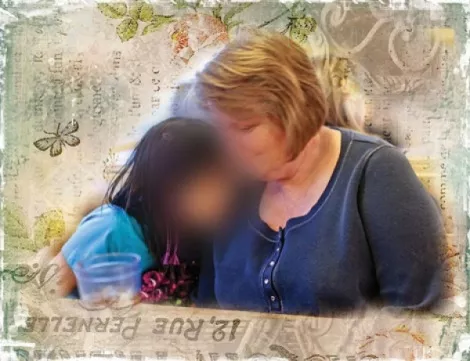

“Literally two hours after she came home, Emily’s first big fight with her older brother broke out,” Speake recalls. “She went after him and was hitting him. She said, ‘If you tell Mom, I’ll kill you.’ ” From past episodes, Emily’s brother knew the violence would escalate if he fought back. Afterward, he let his mom know what happened. “It’s a real hard place for him to be,” says his mother.
Speake didn’t sleep for two nights. “[Emily’s] room is downstairs, and the boys are upstairs. I would lie in bed and worry that she would come up the stairs and hurt one of them,” says Speake.
Emily’s anger and aggression were constant, leading up to the day when she lifted her younger brother’s bike and threw it at him. The bike missed him but hit a neighbor child. Emily denied responsibility, saying, “I am the little girl. I can’t pick up a big bike.” At least six other people had seen Emily throw the bike.
Ever since Speake adopted Emily, she’s known that Emily’s aggression is fueled by assorted diagnoses stemming from being born to a heroin-addicted birth mother. “Her diagnoses are a mixed bag,” says Anna Williams, a child psychiatrist who conducted medication management for Emily. Speake’s been told Emily has everything from reactive detachment disorder, attention deficit hyperactivity disorder (ADHD), oppositional defiant disorder to bipolar affective disorder. Emily was also diagnosed with depression, and her neurological conditions are further complicated by seizures.
Her daughter’s conditions required more treatment and therapy that she as a single mom had the means to provide. While the state provides foster parents with an array of medical services, adoptive parents have far less state-funded medical assistance. As Speake constantly worried about the safety of her sons, the mother couldn’t help but feel the family was reaching a breaking point.
After the bike incident, Speake drove Emily to the emergency room at Primary Children’s Medical Center. They arrived at 8 p.m. At 5 a.m. the next morning, a social worker let Speake know that Emily would be admitted to the University Neuropsychiatric Institute (UNI), a 90-bed psychiatric hospital providing mental-health and substance-abuse treatment. “They said the reason they could admit Emily to UNI was that she admitted to a social worker that she hits and kicks her brothers and hurts them and can’t help herself,” Speake said. While devastated, Speake initially felt relief about the UNI placement. She thought that a solution might be in sight at a time when she felt Emily was not getting better, and probably was getting worse. “I can’t tell you how many times I have cried over it,” she says.
Dr. Williams is one of several mental-health professionals who concurs that Emily needs extensive residential therapy, an option that neither Speake’s medical insurance from her work as a respiratory therapist nor Medicaid will provide. “The therapy she needs costs $11,000 a month. What parent can afford that?” Speake asks. Although Medicaid would have paid for residential treatment at the time Speake first adopted Emily, the program stopped paying for residential treatment in July 2010.
Speake’s hopes were dashed when, at her first meeting with a UNI therapist, she heard the words: “We plan to discharge her.” Speake instantly found herself between a rock and a hard place.
“Rusty had a decision to make,” says adoption attorney Dean Ellis, who represents Speake. “If she brought Emily home without the problems being solved, she would still act out in violent ways. If she refused to bring her home, the state would get involved. She made that choice, knowing that it might look bad for her, but the state has resources that aren’t available to her.”
Speake felt she faced possible criminal charges with either taking Emily home or returning her to state custody. Knowing that the two boys show signs of post-traumatic stress disorder as a result of Emily’s attacks, she said, “I can’t take her back home. Every time she comes back home, she puts the boys in danger.”
The UNI therapist responded that if Speake didn’t take Emily home, UNI would call Child Protective Services, and she would be charged with abandonment. On the other hand, Speake knew that if she didn’t protect the boys, she could be charged with failure to protect. “If one sibling injures or kills another, parents can be held liable,” she explains.
Speake felt she had no choice but to return Emily to state custody, a desperate choice that felt like the devastating opposite of her hopes and dreams. “This is by far the hardest thing I have ever done in my life,” she says. “ I feel I have failed one child but also realize I have to protect the other two,” she says.”